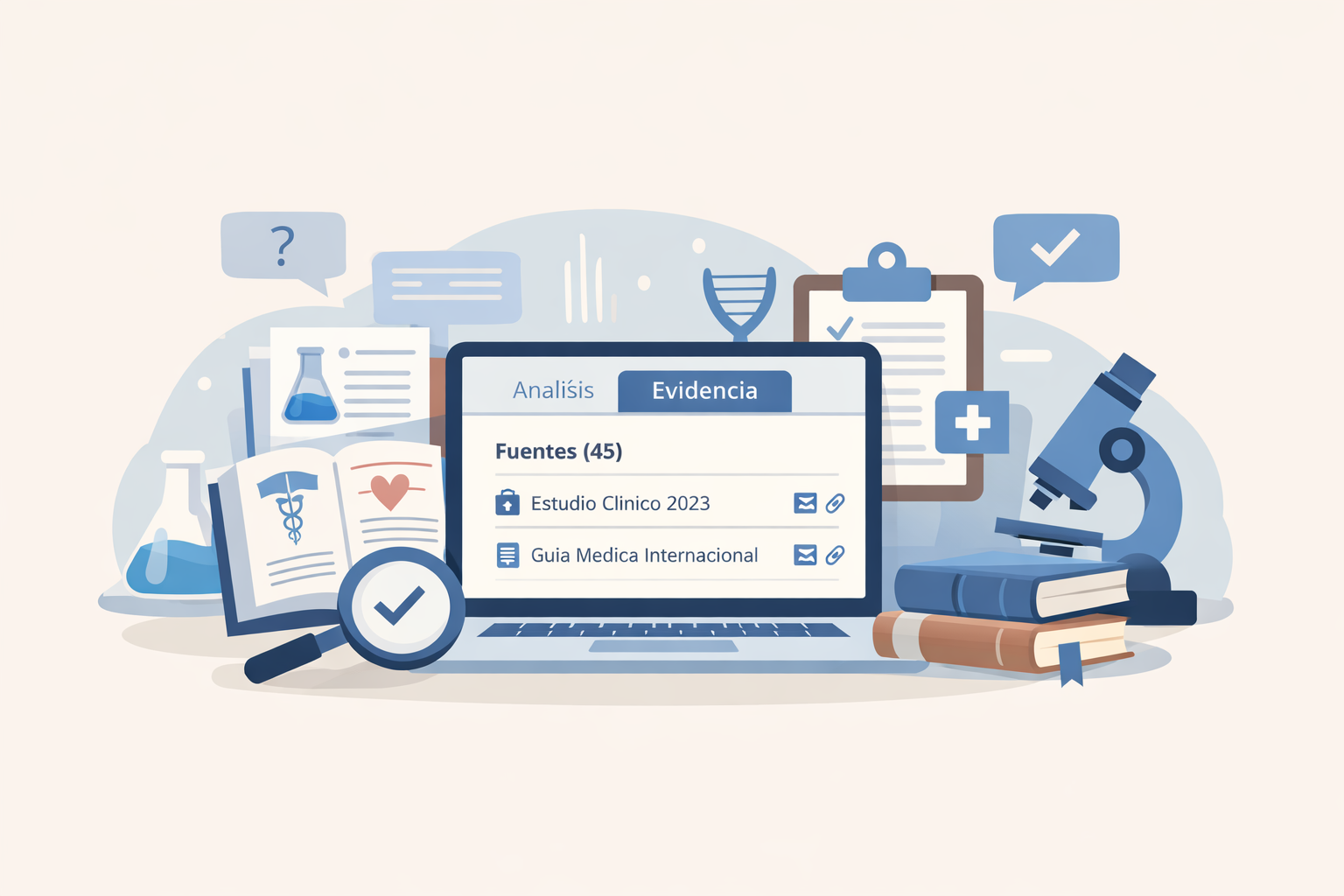By immersing myself in the fascinating world of the artificial intelligence in medicineI can't help but be excited by the immense potential it holds. The healthcare landscape is evolving rapidly and, with the integration of the AI in medicineWe are witnessing a transformation that could change the way we diagnose, treat and manage disease.
So what exactly is the artificial intelligence in medicine? In simple terms, it refers to the use of computer systems that simulate human intelligence to perform various medical tasks. This includes analyzing patient data, identifying patterns and even suggesting treatment options. Imagine having an intelligent assistant at your side, a little digital buddy that never gets tired and processes information faster than your average human brain!
One of the most striking applications of the artificial intelligence for physicians is in diagnostics. For example, algorithms driven by medical artificial intelligence can analyze medical images such as X-rays or MRI scans with astonishing accuracy, often detecting conditions that a human eye might miss. One study I found revealed that the IA in medical imaging could outperform radiologists in certain cases, leading to faster and more accurate diagnoses.
In addition, the medicine and artificial intelligence are working together to improve personalized medicine. With the ability to analyze vast databases, the artificial intelligence in medicine and healthcare can tailor treatments to individual patients based on their genetics, lifestyle and medical history. This means more effective care and better outcomes for patients.
In summary, the articles on aid in medicine that I have been exploring make clear: the artificial intelligence in medicine is not just a buzzword, it is already facilitating revolutionary changes that promise to redefine healthcare as we know it. The journey into this brave new world is just beginning and I can't wait to share more ideas in the sections below!
The Role of AI in Medical Diagnosis and Treatment
![]()
As I delve more deeply into the field of artificial intelligence in medicineImagine walking into a doctor's office where advanced algorithms support every decision made by healthcare providers! Sounds futuristic, doesn't it? But trust me, this is the reality we are heading towards!
Improved Diagnostic Accuracy
One of the most promising applications of the AI in medicine is in improving diagnostic accuracy. For example, algorithms can analyze myriad data points, from medical history and lab results to image scans, to identify patterns that can elude even the most experienced specialists.
A fantastic example is IBM's Watson, which has been praised for its ability to analyze medical literature and patient records at incredible speed. According to a study published in NatureWatson was able to suggest a diagnosis for certain cancers that was correct more than 90% of the time, while human doctors had a success rate of only about 70%. This isn't just AI flexing its muscles; it's about providing doctors with data-driven information that improves their decision-making.
Personalized Treatment Plans
But the role of the artificial intelligence in medicine does not stop at diagnosis. Once a diagnosis is made, AI continues to play a critical role in developing personalized treatment plans. By analyzing a patient's genetic information, lifestyle choices, and responses to previous treatments, the AI for medicine can help design appropriate strategies specifically for each individual.
Take the example of breast cancer treatment, where AI algorithms are used to determine the most effective medication based on the specific characteristics of a patient's tumor. The use of medical artificial intelligence not only helps to personalize treatments, but also minimizes the risk of adverse reactions.
Real World Applications
In practice, we see artificial intelligence used in medicine through a variety of applications, from chatbots that help with preliminary screenings to systems that monitor chronic diseases in real time. For example, the FDA has approved several AI-based systems to diagnose diabetic retinopathy and predict cardiovascular disease risks.
Benefits and Challenges of AI in Medicine
As we continue our journey through the transformational landscape of the artificial intelligence in medicineIn addition to the benefits, it is crucial to discuss not only the benefits, but also the challenges that come with this innovative technology. Understanding both sides will help us navigate its implementation in healthcare effectively.
Benefits of AI in Medicine
First and foremost, the main benefit of the AI applications in medicine is the improvement of diagnostic and treatment accuracy. The artificial intelligence for physicians serves as a powerful tool that improves clinical decision making. For instance, AI algorithms can analyze medical images with unmatched precisionIt's like having a super-smart partner who can identify patterns at lightning speed!
In addition, the systems of medical artificial intelligence can help streamline operations in healthcare settings. Previously time-consuming tasks such as scheduling, bureaucracy and data entry can be automated, allowing healthcare professionals to focus more on patient care rather than administrative burdens. This leads to an overall increase in efficiency and improves the patient experience.
Another compelling advantage is the ability of the IA in medicine and health care to facilitate personalized treatment plans. By considering individual patient data, AI can suggest tailored therapeutic options that maximize efficacy and minimize side effects, a breakthrough in the fight against disease.
Challenges of AI in Medicine
However, the integration of AI in medicine is not without its hurdles. One major challenge is concerns around data privacy. With the reliance on large amounts of patient data for the artificial intelligence in medicineensuring that this information is securely managed and protected is critical. Healthcare providers must convince patients that their information is safe from breaches, an increasingly difficult task in the digital age.
In addition, there is also the issue of trustCan clinicians really trust AI recommendations? AI and medicine need to work together seamlessly, but if clinicians do not fully understand how AI systems arrive at their conclusions, skepticism may arise. It is critical that articles on artificial intelligence in medicine address how the technology works and train healthcare professionals to understand its capabilities and limitations.
A Delicate Balance
Finding a balance between taking advantage of the benefits of the medical artificial intelligence while addressing privacy concerns and building trust among healthcare providers will be key. The road may be bumpy, but the potential rewards of the artificial intelligence for medicine make it a journey worth taking. The question remains: are we ready to embrace this next step in the evolution of healthcare?
Future Trends: The Evolving Landscape of Artificial Intelligence in Health Care
As I look to the future of health care, the future of the artificial intelligence in medicine not only looks brilliant, but is burning with potential! We are on the verge of a technological revolution, and the systems of AI in medicine are poised to play an even more significant role in addressing healthcare challenges.
Advances in Machine Learning and Deep Learning
We are witnessing continued advances in machine learning and deep learning technologies that will further improve the artificial intelligence for physicians. Algorithms are becoming more sophisticated, improving their ability to learn from data over time. For example, neural networks can now recognize patterns in medical images with surprising accuracy, making earlier diagnosis of conditions such as Alzheimer's or various types of cancer possible.
Imagine a world where your doctor is equipped with a system that constantly learns from mountains of data, offering insights that can predict health problems before they develop. This isn't science fiction, it's on the horizon!
The Rise of AI-Powered Wearable Devices
Another exciting trend is the advent of AI-powered wearable devices. Devices that monitor everything from heart rate to blood sugar levels are becoming commonplace. These smart technologies can continuously collect patient data and provide real-time feedback. Soon, systems medical artificial intelligence will be able to analyze this data to detect abnormalities or even alert users to potential health problems before they become serious. Think of it as having a personal health assistant on your wrist!
Integration of Telemedicine and IA
The COVID-19 pandemic has accelerated the adoption of telemedicine, and it's here to stay! The integration of artificial intelligence in medicine and healthcare with telemedicine platforms will lead to more personalized virtual consultations. For example, AI algorithms can analyze patient symptoms reported during a virtual visit and provide diagnoses or possible treatment options for physicians in real time. This not only saves time, but also enables more tailored care.
Ethical Considerations and Regulatory Frameworks
As we move into this advanced era of AI in medicine, ethical considerations will become increasingly crucial. There will be an urgent need for comprehensive regulatory frameworks to guide the implementation of artificial intelligence in healthcare while ensuring patient safety and confidentiality.
Conclusion: An Uncharted but Promising Journey
The evolutionary landscape of the artificial intelligence in medicine promises incredibly diverse applications that can transform healthcare delivery. While challenges remain, the exciting possibilities ahead invite us into uncharted territory. As we embrace the technology, we must also remain vigilant in fostering an ethical framework to ensure that these advances benefit both patients and healthcare providers. The future holds great promise and I can't wait to see where this journey takes us next!
Transform Your Medical Practice with AI-Powered Solutions!
As artificial intelligence continues to revolutionize medical care-improving the quality of care and diagnostic accuracy and elaborating personalized treatment plans-medical professionals face the urgent challenge of optimizing their workflows to keep up. You may feel overwhelmed by administrative tasks, leaving less time for the care that really matters - that's where Itaca.ai comes in!
Imagine a world where you can automatically generate notes SOAP complete, receive real-time clinical responses with appointments and obtain contextual perspectives adapted to your patients' cases. Itaca.ai not only eases the burden of documentation, but also enriches your practice with a community platform for questions and answers and user-contributed articles. Why struggle with bureaucracy when you can focus on what you do best: caring for your patients?
Transform your practice today! Visit Itaca.ai and discover how our AI-powered solutions can elevate your documentation process and improve patient consultation experiences. Don't wait-embrace the future of healthcare now!





Leave a Reply